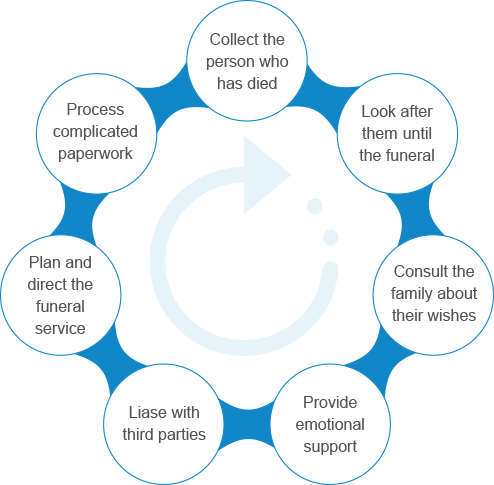Ultimate Guide to Funeral Directors
A detailed look at funeral directors and how they can help you
What do funeral directors do and why are they important?
In this guide we take a look at their role and the jobs they carry out, to learn more about how they can help you.
When a loved one dies, one of the first things you will need to do is speak to a funeral director. Although you can choose to arrange the funeral yourself, choosing an experienced and skilled funeral director can help unburden you from the stress of funeral arrangements.
Did you know?
Who's who?
The funeral profession includes people who do many different kinds of jobs. Sometimes, terms such as funeral director, mortician and undertaker are used by people to mean the same thing, but there are a few differences as you’ll see below.
Funeral Director
The modern term for a person who helps organise all elements of a funeral service, liaising with the bereaved, local government services and industry providers. The funeral director oversees all funeral arrangements. Modern funeral directors can provide a comprehensive range of services and help you with every aspect of your loved one’s funeral.
Funeral Arranger
A funeral arranger works closely with the funeral director to ensure all funeral arrangements go to plan. They listen to the bereaved about their needs and provide the relevant information that will help them make decisions. A funeral arranger may also help organise specific elements of the funeral service, under the guidance of the funeral director.
Undertaker
People historically used the word undertaker to mean somebody who undertakes responsibility for your loved one’s body. Typically, this person only provided a coffin and worked with other professionals to provide a full funeral service. Though this term is still used, particularly in the United States, the term funeral director is now more widely used.
Embalmer
Embalming is a process which temporarily preserves someone’s body when they die and may be performed prior to a viewing. Not all funeral directors are embalmers, and vice versa, although some people are qualified to do both. Some funeral homes may have their own embalmers, while others will enlist the services of an independent embalming expert.
Mortician
This term is more commonly used in the US to refer to a funeral director. In the UK, the term mortician is more likely to refer to someone who works in a hospital. They may be involved with post-mortem examinations and looking after your loved one’s body, before the funeral director arrives to collect the person who has died and prepare them for their burial or cremation.
Funeral attendant
Funeral attendant is a term generally used to refer to someone who helps with the practical organisation of the funeral on the day. This may include acting as a pallbearer to carry the coffin, driving a funeral car, or arranging floral tributes prior to the funeral ceremony. Funeral attendants also escort the mourners and direct them to their seats.
All in a days' work
A funeral director’s role involves a wide range of skills and tasks. A funeral director oversees other people in their roles, is skilled at event planning and treats people with consideration and courtesy.

A funeral director can help you arrange every element of the funeral service, from collecting and looking after your loved one, to helping you arrange the funeral service and organise the wake.
-

Valuable experience
It can take years of experience in the profession to become a funeral director. They know exactly what needs to be done, thanks to their skills and knowledge.
-

Moving and caring for your loved one
Funeral directors are on call whenever they are needed, day or night. They understand the practicalities of moving and caring for someone that has died.
-

Practical and emotional support
They will help you and your family through this difficult time, as well as provide support on the day of the funeral to make sure everything goes to plan.
-

Connections in the industry
Want a personalised coffin, a dove release, a Star Wars themed funeral, or your loved one’s ashes turned into fireworks? They know who to ask.
-

Arranging funeral transportation
Your funeral director can arrange many types of transport, from a traditional horse and carriage to a motorbike or hot-rod hearse.
-

Long-term bereavement support
They’ll be able to signpost you to community groups and counsellors in your local area that provide ongoing grief support.
-

Organising a celebrant or minister
They’ll be able to signpost you to community groups and counsellors in your local area that provide ongoing grief support.
-

Notifying people
Funeral directors are experienced at organising death notices and obituaries to be published in newspapers, as well as online obituaries.
-

Always on call, 24/7
Funeral directors are always on call, every day of the year. No matter what time of day or night, they can help you when a loved one dies.
-

Arranging the wake
Your funeral director can book a venue for the wake or reception, arrange the catering and help inform the mourners about the day’s events.
-

Lots of paperwork
Funeral directors can help with completing important documents such as death certificates and certificates for burial or cremation.
-

Liasing with third parties
They can contact and organise all the third party services, including cemeteries and crematoria, florists, celebrants and masons.
Career opportunities
There are various ways of entering the funeral profession. Most often, people join a funeral home and start their career as funeral arrangers or assistants and receive training on the job to work their way up.
There are various qualifications funeral professionals may study for. Many of these are provided through organisations such as the National Association of Funeral Directors (NAFD) and the National Society of Allied and Independent Funeral Directors (SAIF). These qualifications range from basic introductions to the profession to diplomas, such as the NAFD’s Diploma in Funeral Directing.
Rules and regulations
The NAFD and SAIF are professional organisations which represent hundreds of funeral homes across the UK.
These associations have a code of ethics and regulations that all their members must adhere to. That’s why choosing a funeral director who is a member of one of these organisations is recommended.
A caring profession
Some people underestimate just how important a good funeral is in terms of saying goodbye to their loved ones. Many respected psychologists and grief counsellors agree that the funeral can be the first step in acknowledging and coping with a bereavement.
Scientific research** has shown that rituals such as the funeral can ease the symptoms of grief.
Clinical psychologist Dr Louis Gamino also found that a well-organised funeral that goes smoothly is linked to fewer symptoms of complicated grief for the bereaved in the long term.
An experienced funeral director can help ensure the funeral goes to plan, allowing loved ones to focus on saying goodbye to the person that has died.
A quality service
According to a YouGov study*** of people who had arranged a funeral in the past five years, the vast majority were satisfied or very satisfied with the service provided by their funeral director.
95%
of people were satisfied with their funeral director
94%
of people would use their funeral director again
* Average salary for a funeral director according to www.payscale.com, updated 26 October 2016
** M.I. Norton and F. Gino, ‘Rituals alleviate grieving for loved ones, lovers, and lotteries’, 2013, and Louis A. Gamino, Grief Adjustment as Influenced by Funeral Participation and Occurrence of Adverse Funeral Events, 2000.
*** Data collected by YouGov on behalf of the NAFD, in partnership with Cruse Bereavement Care.
Discover more






